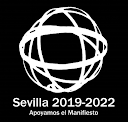| LitraCon (tm) es el nombre de este material inventado por el arquitecto húngaro Ron Losonczi. Se trata de un nuevo compuesto con la resistencia del hormigón, pero complementado por fibras ópticas embebidas a través de las cuales pasa la luz, permitiendo distinguir las siluetas al otro lado del muro. El material se presenta en forma de bloques que pueden utilizarse en la composición de muros o pilares. |
Hasta el momento solo ha sido usado de forma experimental para realizar un pequeño monumento conmemorativo de 4 metros que celebra la entrada de Hungría en la UE. Proximamente será también usado en la construcción de una casa experimental en Alemania, ubicando los muros de LitraCon en los puntos mas frecuentados de la vivienda.
Download
Technical Data (.pdf) 232kb
Download
Price List (.pdf) 234kb
Colours and textures
White - Cserhát C/D4
Grey - Duna C/D4
Black - Balaton C/D4
Other colours are available on request!
Construction & reinforcement
We recommend to apply 2-component epoxy resin when gluing Litracon™ blocks together. The outer part of the fugues can be filled with cement based grout material in the same colour like the blocks. If it is needed, one can place plain reinforcing rods in between the blocks - whether horizontally or vertically. Do not hesitate to contact us if you need our assistance!
Technical data
Form:prefabricated blocks
Ingredients:
96% concrete
4% optical fibre
Density:
2100-2400 kg/m³
Compressive strength:
50 N/mm²
Bending tensile strength:
7 N/mm²
Finish:
polished
Block sizes
Maximum block size:600 x 300 mm
Standard block size:
600 x 300 mm
Thickness:
25-500mm
Other (smaller) block sizes are available on request.
Fibre distribution
Motto: „Each piece of Litracon™ tells you a story”
The size and the arrangement of the fibers can differ in each Litracon™ block. In what follows are some of the various ways the fibers can be arranged in each block – it can be a regular matrix-like or even an organic woodcut-like.
The standard Litracon™ blocks come out with organic distribution of fibres:
Organic
Layers











